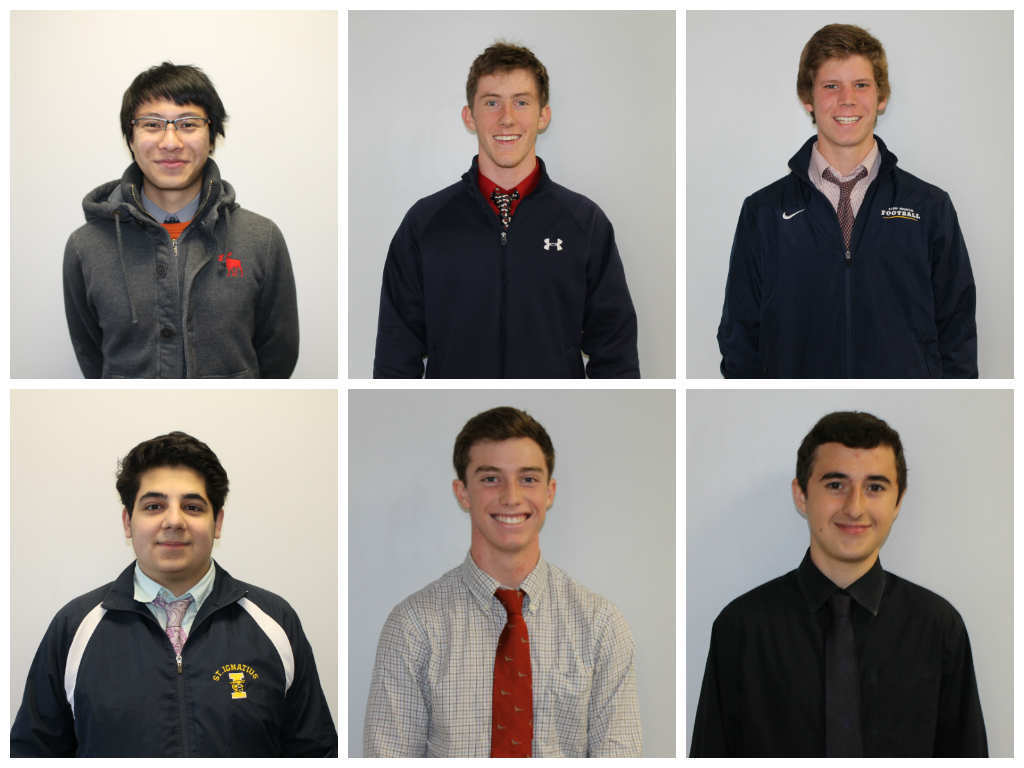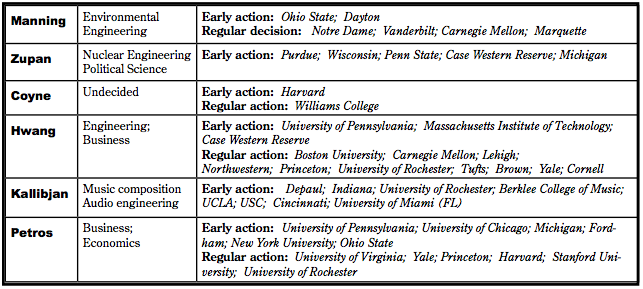by Alastair Pearson ’14
The college application process consists of colleges who need students and the students who want to attend them. These are their stories.
Adam Kallibjan
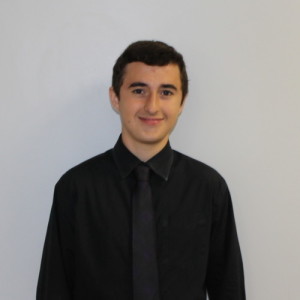
Saint Ignatius band librarian Adam Kallibjan hates rap, is just willing to tolerate dubstep, and adores classical music. He also wants a job in the modern music industry. His chosen profession: composer.
Kallibjan has essentially created a college application plan that rejects the most fundamental norms of the system. Music schools barely care about transcripts, and he says he sent Berklee his as a courtesy.
The linchpin of the music school application is the live audition, which must be done in person at the college campus. His first audition is coming up in November at Berklee, and he has already chosen and begun practicing a piece.
The rest of the schools Kallibjan is applying to aren’t as relaxed as Berklee, and he will have to memorize a number of specifically requested musical selections for auditions coming up around February.
Kallibjan says that his ambition to go to music school means he has had a significantly different application process from his peers in instrumental music at Ignatius.
“Even within the band, I think I’m the only one who’s doing this,” he said. “Being in the symphonic band has helped me like performance-wise. I’ve done everything on my own to prepare myself.”
Although Kallibjan has been playing the piano for 11 years and the saxophone for six, and currently works with the Cleveland Institute of Music, he says his parents had some doubts about his desired career path.
“At first they were just concerned,” he said. “Lately, they’ve been a little bit more supportive.
He wants to spend a career working with music, doing what he does in his spare time – composing.
“It’s like my ultimate dream right now,” he said.
Jack Coyne
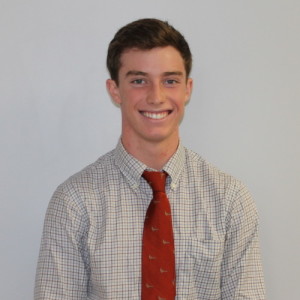
After being recruited by both Harvard and Miami University, nationally ranked golfer Coyne chose to apply early to just Harvard and Williams, two of the most selective undergraduate colleges in the country. One in 6 applicants were accepted to Williams in 2012, and barely one in 20 were admitted to Harvard.
Although Coyne has not chosen a major yet, he said that overall academic strength was among the most important of the numerous factors he was weighing during his college application process.
He is aiming to match his ambitious goals as a potential Division 1 athlete with an appropriately competitive academic environment.
“Academic strength, best chance for me to get into [the] best business school, most comfortable setting for me to spend four years in,” Coyne said, describing his criteria for college selection.
He said that in addition to the city setting, Harvard stood out for one reason in particular.
“Academic excellence.”
Michael Zupan
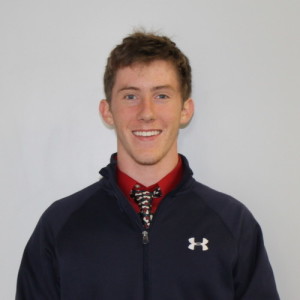
Michael Zupan, the student body president, has focused on an unusual combination of disciplines in narrowing down his list of colleges: nuclear engineering and political science.
Zupan said his options were relatively constrained given the scarcity of schools offering a nuclear engineering major. He intends to use the double major in political science to complement the technical skills he will learn as an engineer.
“I’m interested in nuclear engineering due to many factors, the largest being the apparent underuse of such a good technology,” Zupan said. “I want to get into political sciences at the same time so that I understand the technology and safety issues.”
He aims to continue as a student leader in some capacity at whatever school he ultimately attends, although he does not want to continue as a varsity athlete in college.
Zupan says he thinks he will be a competitive applicant to the colleges he is applying to, though he wishes his test scores were backed up by a higher GPA. If he is not accepted at one of his top choices, he believes he will be capable of handling the disappointment with the aid of student body vice president Owen Manning.
“I’ll probably cry a little bit, then go up to East Coast Custard while Owen’s working and drown my sorrows in a malt shake,” Zupan said.
Owen Manning
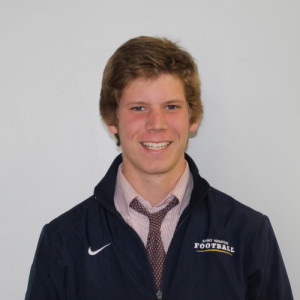
Owen Manning has renounced his past.
The former leading light in the Fr. Streicher Humanities Program and current student body vice-president has decided to become an engineer, joining fellow Streicher alumnus and student body president Michael Zupan in dropping the fine arts for cold, hard science.
“The thing is, I think I’m still a reading and English guy,” Manning said. “It’s important to be able to read and write well – just be able to relate to people.”
He hasn’t decided on a specific engineering discipline, although he is considering focusing on the environment. But Manning is committed to ensuring that he has a broad-based college experience that incorporates strong engineering and liberal arts programs, a meaningful service program, and a good “community feel.”
Manning has narrowed his list down to just six schools, the result of both his goal to keep the application workload down to a manageable level and his specific criteria.
“That was something that I really wanted to do – keep a narrower list,” he said. “I had sort of a specific search with engineering. Most of my schools are pretty local.”
His applications will be backed by a personal essay describing a passion, and experience, that few other applicants will be able to match. He is an avid writer of haikus, the three-line, seventeen-syllable Japanese poems.
“One of the things that I write about in my college essays is my haiku talent,” Manning said. “I did a talent show at St. Joe’s last year, and that was kind of my defining moment.”
Although no awards were given, Manning said he was the champion in his own mind.
“I killed it,” he said. “People were going nuts.”
Follow Owen’s haikus on Twitter @Haikus_By_O
Sami Petros
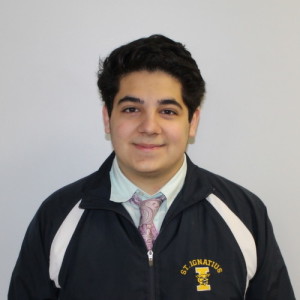
Sami Petros is nothing if not international. The proficient Arabic speaker and first-generation American was raised in a Lebanese family that spans the entire globe, from Dubai to Paris, London to Australia to China, Japan, Oman, and Qatar.
And he wants to take his own goals as a businessman global as well. Petros is applying to schools where he can study business and economics, with a focus on international business. At New York University, he is applying specifically to programs housed in Abu Dhabi, Shanghai, and London.
“I’m pretty good at adapting. I like to pick up different cultures,” Petros said. “It is my firm belief that our generation must learn to conduct business in the global arena.”
He has been working feverishly on the Common App essay question and gone through endless drafts for school-specific essays. Petros said that he is adopting a wide-ranging application strategy.
“A lot of these are reach schools for me, a shotgun approach – a Hail Mary if you will,” he said. “”I loved a lot of the ones I visited, which is half the reason, and I’d be happy at any of them.”
He plans to study Arabic in addition to business, both to boost his business versatility and to help him around the house.
“I know swear words, and I understand it fairly well,” Petros said, but although he can successfully talk through dentist appointments in Arabic, he still struggles to understand his family at times and can’t read the language.
Even though he’s applying to select schools, he said that his parents have not been pressuring him through the process.
“My parents would support me whether I wanted to live in a van down by the river,” Petros said. “That being said, I wished they pressured me a little more.”
As Petros finishes the college application season, he is focused on the future and developing his multicultural approach to business.
“I am a person whose identity has been forged by the world of business,” he said. “We cannot overlook the role of local subtleties and cultural nuances.”
Vincent Hwang
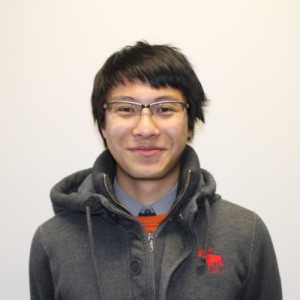
Thirteen schools drawn from the creme de la creme of selective American universities. An applications plan targeted at 13 colleges with the aim of scheduling five to six courses – per semester. Double majoring in rigorous disciplines at the world’s most demanding academic institutions.
Vincent Hwang does not let opportunities pass by.
The omni-involved Ignatius senior is planning to major in both business and engineering in college, which will sum to a total time in class he estimates at around 20 hours per week.
“I’ve been thinking about what to do with my life for a long time,” Hwang said. “I have some leadership skills that not all engineers have.”
He is applying to the selective Jerome Fisher program at the University of Pennsylvania, which allows students to major in business at the top-ranked Wharton School of Business and in engineering at the nationally ranked School of Engineering and Applied Science.
Hwang was introduced to the program during his freshman year rides to school with Matthew Petrella, Class of ‘11, a current Fisher Program participant. He said his personal research had only increased his desire to apply.
“I visited UPenn last summer, and not only did I fall in love with the campus, I fell in love with the program,” Hwang said. “This program is not only for the bookish type. They want someone who is well-rounded.”
He says that if he gets denied from UPenn or any of his other top choices, he will be able to handle the disappointment given his experience last year being denied to all four of the summer programs he applied to.
“I can double major anywhere. I think I’d be okay anywhere,” Hwang said. “I also think that I’ve chosen some really good schools. I’d be happy at any of them.”
But, like many Ignatius seniors, Hwang said he has been challenged trying to keep to his personal timetable for completing the huge volume of application materials.
“I think I’ve been very good at procrastinating,” he said.


